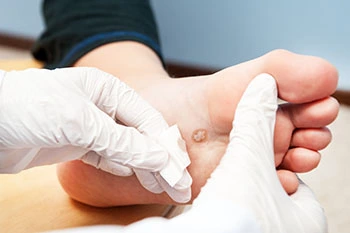
Warts are caused by a virus that penetrates the skin, forming a raised, fleshy bump. They can crop up on any part of the skin, including the feet. Some warts go away on their own without treatment; others recur, grow in size, or spread to form clusters of warts. In general, warts are not harmful and do not cause pain or discomfort; however, they are contagious because they stem from a virus.
On the foot, warts can grow on the sole and toes, as well as any other part. Plantar warts occur on the sole of the foot and are flatter and less fleshy than most other warts. They can result from walking barefoot on dirty, germy surfaces that harbor the virus. Viruses prefer a warm, moist environment, so public areas with wet floors, such as swimming pools and showers are perfect breeding grounds for plantar warts. Plantar warts on the heel or ball of the foot can be painful and sensitive due to the pressure placed on these areas of the foot.
To avoid plantar warts, wear plastic or rubber shower shoes, slides, or flip-flops rather than walking barefoot on damp floors or ground, especially in public areas. Remember, warts are contagious and will spread person-to-person or to other parts of the body. Maintain proper foot care, keeping feet and footwear clean and dry.
There are over-the-counter wart treatments; however, warts can recur or resist treatment (consult a doctor before taking or using any medication). Wart removal is best left to a doctor; podiatrists can safely treat any wart on the foot using a variety of methods, such as prescription medications, surgical removal, and laser cautery.
